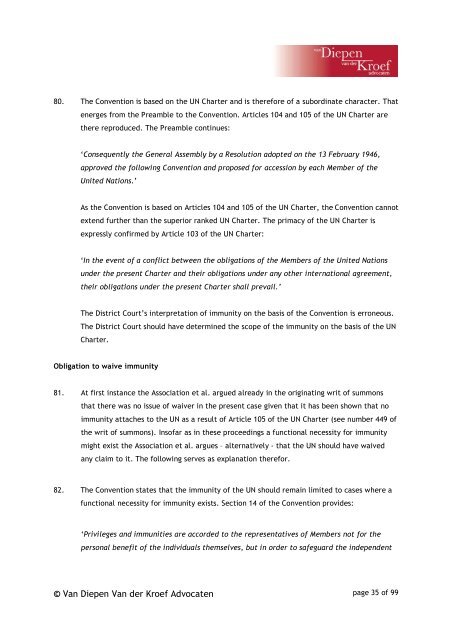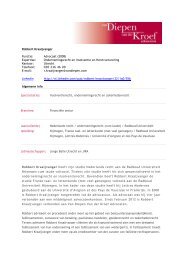© Van Diepen Van der Kroef Advocaten
© Van Diepen Van der Kroef Advocaten
© Van Diepen Van der Kroef Advocaten
- No tags were found...
Create successful ePaper yourself
Turn your PDF publications into a flip-book with our unique Google optimized e-Paper software.
80. The Convention is based on the UN Charter and is therefore of a subordinate character. Thatenerges from the Preamble to the Convention. Articles 104 and 105 of the UN Charter arethere reproduced. The Preamble continues:‘Consequently the General Assembly by a Resolution adopted on the 13 February 1946,approved the following Convention and proposed for accession by each Member of theUnited Nations.’As the Convention is based on Articles 104 and 105 of the UN Charter, the Convention cannotextend further than the superior ranked UN Charter. The primacy of the UN Charter isexpressly confirmed by Article 103 of the UN Charter:‘In the event of a conflict between the obligations of the Members of the United Nationsun<strong>der</strong> the present Charter and their obligations un<strong>der</strong> any other international agreement,their obligations un<strong>der</strong> the present Charter shall prevail.’The District Court’s interpretation of immunity on the basis of the Convention is erroneous.The District Court should have determined the scope of the immunity on the basis of the UNCharter.Obligation to waive immunity81. At first instance the Association et al. argued already in the originating writ of summonsthat there was no issue of waiver in the present case given that it has been shown that noimmunity attaches to the UN as a result of Article 105 of the UN Charter (see number 449 ofthe writ of summons). Insofar as in these proceedings a functional necessity for immunitymight exist the Association et al. argues – alternatively - that the UN should have waivedany claim to it. The following serves as explanation therefor.82. The Convention states that the immunity of the UN should remain limited to cases where afunctional necessity for immunity exists. Section 14 of the Convention provides:‘Privileges and immunities are accorded to the representatives of Members not for thepersonal benefit of the individuals themselves, but in or<strong>der</strong> to safeguard the independent<strong>©</strong> <strong>Van</strong> <strong>Diepen</strong> <strong>Van</strong> <strong>der</strong> <strong>Kroef</strong> <strong>Advocaten</strong> page 35 of 99
















